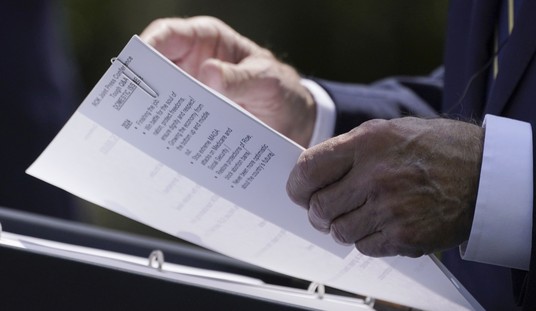The Associated Press Stylebook, a sort of dictionary/bible for reporters, is always a little bit behind the times, but the editors try to stay woke by giving more wholesome options for outdated terms like “illegal immigrant” (acceptable variations include “living in” or “entering a country illegally” or “without legal permission”).
For example, California Gov. Jerry Brown this weekend officially added a third gender option — “nonbinary” — to legal documents like birth certificates and drivers licenses.
California becomes the first state to officially recognize a ‘third gender’ https://t.co/rDuWSoXAmI
— TheBlaze (@theblaze) October 16, 2017
Nonbinary? What happened to pronouns like ze?
Fortunately for the rest of us, the Associated Press had an online chat last week to address some questions that arise when there are at least three gender options in play. Here are some tips from the pros.
Gender refers to a person’s social identity, while sex refers to biological characteristics. #APStyleChat
— AP Stylebook (@APStylebook) October 10, 2017
Use transgender for people whose gender identity doesn’t match the sex or gender they were identified as having at birth. #APStyleChat (1/3)
— AP Stylebook (@APStylebook) October 10, 2017
“Were identified as having at birth.”
They/them/there is OK in limited cases as a singular and/or gender-neutral pronoun; do not use other neutral pronouns like ze. #APStyleChat https://t.co/tcvwYH4Sby
— AP Stylebook (@APStylebook) October 10, 2017
Call people transgender only if relevant; give the name they use publicly; avoid references to being born a boy or girl. #APStyleChat (2/3)
— AP Stylebook (@APStylebook) October 10, 2017
Avoid references to being born a boy or a girl — got it. Just forget that whole “identified as having at birth” deal.
Avoid transgendered or transsexual; don’t call someone a transgender; trans is OK on second reference and in headlines. #APStyleChat (3/3)
— AP Stylebook (@APStylebook) October 10, 2017
Transition is the process by which people match their physical characteristics to their gender identity. #APStyleChat (1/2)
— AP Stylebook (@APStylebook) October 10, 2017
For medical procedures often but not always used for a transition, say sex reassignment or gender confirmation. #APStyleChat (2/2)
— AP Stylebook (@APStylebook) October 10, 2017
Hold up: So avoid references to being born a boy or a girl, and don’t use the old term “sex change” — now it’s “gender confirmation”?
This is the stuff that will turn me into an Oxford comma advocate https://t.co/RgjPbbj9DL
— Jeff Poor (@jeff_poor) October 14, 2017
https://twitter.com/emkirk50007/status/919460395487809536
And even they’re considered behind — although they have left open the possibility of using pronouns like ze and zir “if usage increases.”
And in case you were wondering, you can still use plain old LGBT and be considered woke, at least by AP standards.
LGBT or LGBTQ are acceptable shorthand for lesbian, gay, bisexual, transgender and questioning and/or queer. #APStyleChat (1/2)
— AP Stylebook (@APStylebook) October 10, 2017
Other variations such as LGBTQIA are also OK with explanation; I is usually for intersex, A for allies and/or asexual. #APStyleChat (2/2)
— AP Stylebook (@APStylebook) October 10, 2017
So what about the completely made-up term “homophobic?” Has AP found a more accurate term that doesn’t rely of pseudo-psychology?
Homophobia is acceptable in broad references and quotes. When describing individuals' actions, use more specific language. #APStyleChat https://t.co/SFHYYxyq5p
— AP Stylebook (@APStylebook) October 10, 2017
Use more specific language; e.g., “His religious objection to baking a wedding cake for the same-sex couple was proof of his homophobia.”
* * *
Related:
'The wording is settled?' AP stylebook's 'new entry' sure to win approval from Al Gore and Bill Nye http://t.co/VOg3REUuLO
— Twitchy Team (@TwitchyTeam) March 27, 2015
























Join the conversation as a VIP Member